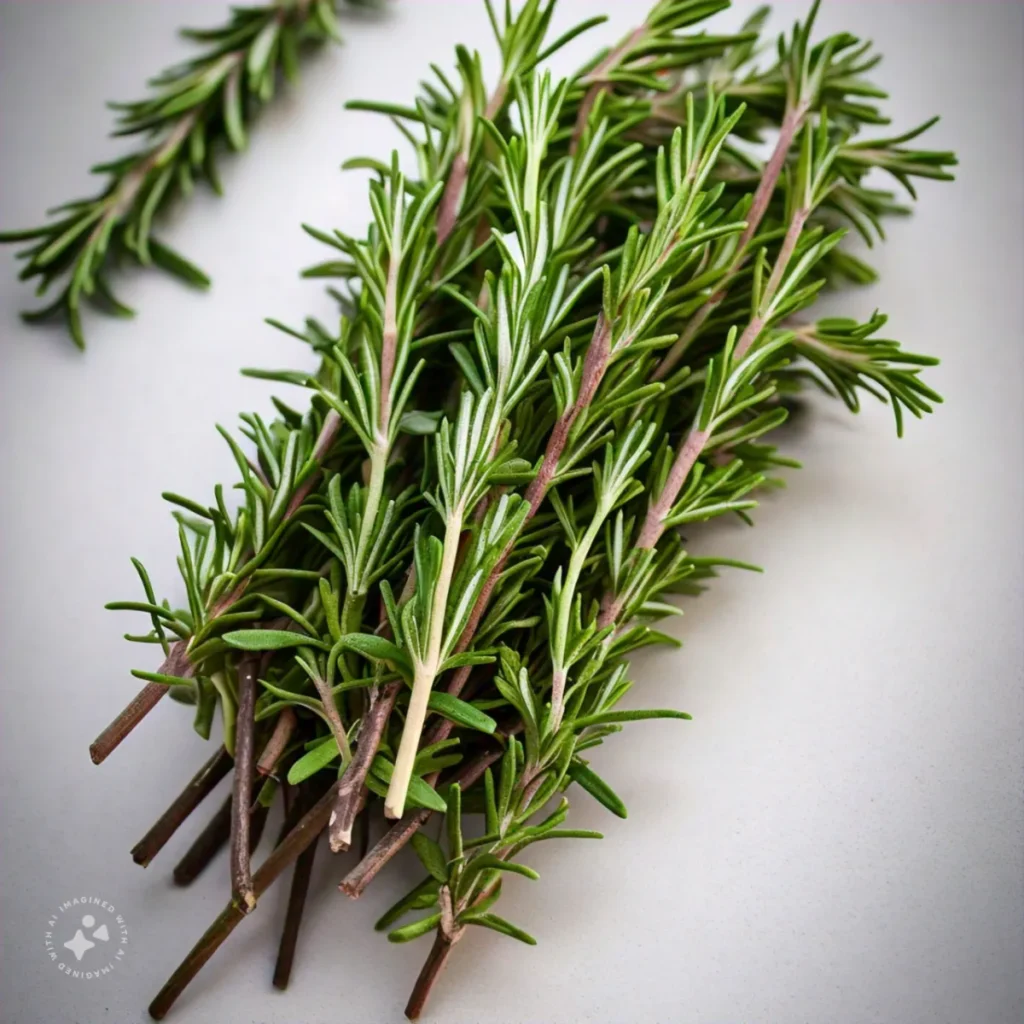
Introduction to Rosemary and Its Historical Usage
Rosemary (Rosmarinus officinalis) is a perennial herb with needle-like leaves and a distinctive aroma, originating from the Mediterranean region. This robust plant has been revered since ancient times not only for its culinary appeal but also for its medicinal and cosmetic properties. Rich in antioxidants and natural oils, rosemary has been a staple in diverse cultural practices, dating back to ancient Egyptian, Roman, and Greek civilizations.
In ancient Egypt, rosemary was an integral part of their burial rituals due to its preservative qualities. The Greeks and Romans also held rosemary in high esteem, often using it in religious ceremonies and as a symbol of remembrance and fidelity. Apart from its symbolic uses, these cultures valued rosemary for its practical benefits, particularly in enhancing memory and boosting cognitive functions. This traditional usage aligns with its incorporation in academic garlands worn by students in ancient Greece.
Medicinally, rosemary has been employed for centuries. Traditional herbal medicine often utilized the herb to alleviate digestive issues, muscle pain, and to stimulate hair growth. The essential oils derived from rosemary have been incorporated in massage and vapor therapies to promote relaxation and respiratory health. Its antiseptic and anti-inflammatory properties made it a common remedy in early folk medicine, contributing to its enduring reputation.
Rosemary’s applications in beauty routines are also well documented. Historical texts reveal that it was commonly infused in oils and tonics to enhance skin complexion and treat wounds. The herb’s antimicrobial aspects provided a natural solution for skincare, long before the advent of modern cosmetics. This legacy continues as contemporary hair and skin care products harness the benefits of rosemary, showing that this humble herb transcends its historical roots to remain invaluable in today’s beauty and wellness spheres.
Nutrient Profile of Rosemary
Rosemary is a powerhouse of nutrients and bioactive compounds that offer significant benefits for both hair growth and skin health. Extensive research highlights the herb’s antioxidant properties, primarily due to its rich content of vitamins and essential oils. Among the notable vitamins present in rosemary are Vitamin C and Vitamin A. These vitamins play a crucial role in collagen production and maintaining the structural integrity of the skin, respectively. Vitamin C, known for its antioxidant properties, helps combat oxidative stress and supports the repair of skin tissues. On the other hand, Vitamin A supports in cell production and turnover, ensuring the skin remains smooth and supple.
Moreover, rosemary is a valuable source of several key minerals, including iron, calcium, and magnesium. Iron is essential for the transportation of oxygen to hair follicles, thus promoting healthy hair growth. Calcium is necessary for the proper growth and development of cells, including skin cells, thereby aiding in the maintenance of a healthy complexion. Magnesium, another vital mineral found in rosemary, plays a role in reducing inflammation and calming sensitive skin, making it particularly beneficial for those with conditions such as eczema or psoriasis.
The essential oils present in rosemary, such as rosmarinic acid and carnosic acid, contribute remarkably to its therapeutic properties. These compounds possess antimicrobial and anti-inflammatory qualities, which help in treating scalp conditions like dandruff and bacterial infections. Additionally, the stimulating nature of rosemary essential oil improves blood circulation to the scalp, thereby encouraging hair follicles to grow stronger and thicker strands. By incorporating rosemary into your hair and skincare routine, you leverage these myriad nutrients and compounds to enhance overall health and vitality.
Rosemary for Stimulating Hair Growth

Rosemary has long been revered for its therapeutic properties, particularly in the realm of hair care. One of the most compelling benefits of rosemary is its ability to stimulate hair growth. This stimulation occurs through several mechanisms, each playing a critical role in enhancing hair health and robustness.
Firstly, rosemary is known to promote blood circulation in the scalp. When the blood flow to hair follicles is increased, it can lead to healthier and stronger hair growth. A study published in the journal of Skinmed highlighted that increased blood circulation helps deliver essential nutrients to the hair follicles, which can rejuvenate dormant follicles and foster new hair growth.
Additionally, rosemary contains ursolic acid, which has been shown to improve the condition of hair follicles. By enhancing the delivery of nutrients and oxygen to the hair root, rosemary oil can effectively boost the growth phase of the hair cycle. Experts like Dr. Julie Russak, a dermatologist, affirm the effectiveness of rosemary in improving follicle health and optimizing hair growth.
Furthermore, rosemary exhibits potent anti-inflammatory properties that can relieve scalp irritation and curb conditions such as dandruff. This anti-inflammatory effect helps create an optimal environment for hair growth. The essential oils in rosemary have also been found to balance scalp oils, which is crucial for maintaining a healthy scalp that supports hair growth. The balancing of scalp pH further protects hair from becoming brittle and breaking off.
Scientific studies, including a 2015 trial published in the journal “Evidence-Based Complementary and Alternative Medicine,” have shown that rosemary oil is as effective as minoxidil, a standard treatment for hair loss, in promoting significant hair regrowth over a period of six months.
In sum, rosemary is a multifaceted herb that enhances hair growth by promoting blood circulation, improving follicle health, and maintaining a balanced scalp environment. Through its evidence-backed properties, rosemary stands out as a natural and effective solution for those looking to boost their hair health.
Combating Hair Loss with Rosemary
Rosemary has long been revered for its myriad health benefits, particularly in the realm of hair care. One of its most noteworthy attributes is its ability to combat hair loss. This powerful herb contains ursolic acid, which is instrumental in strengthening hair follicles. By reinforcing the follicle roots, rosemary helps prevent premature hair loss and promotes thicker, healthier strands.
Another pivotal benefit of rosemary is its efficacy in preventing dandruff, a common cause of hair loss. The herb’s antimicrobial properties address scalp infections and fungal activity, which often lead to flaking and itching. Regular application of rosemary oil or rinses can help maintain a clean, healthy scalp, thereby reducing the occurrence of dandruff and its associated hair loss.
Rosemary also improves blood circulation to the scalp, ensuring that hair follicles receive essential nutrients. Enhanced circulation not only supports hair growth but also fortifies existing hair, making it more resilient to breakage. A simple rosemary oil massage can significantly stimulate blood flow, nurturing the scalp and hair roots.
Testimonials abound with success stories involving the use of rosemary for hair health. For instance, Sarah, a 35-year-old from New York, shared her experience: “After struggling with hair thinning for years, I began using rosemary oil treatments twice a week. Within three months, my hair was visibly fuller, and the persistent dandruff was gone.”

Similarly, a study on patients with alopecia areata revealed that those who massaged their scalps with rosemary oil experienced substantial hair regrowth compared to those who used a placebo. These real-world applications and scientific observations affirm rosemary’s potential in combating hair loss and revitalizing scalp health.
Incorporating rosemary into your hair care routine, through oils, shampoos, or homemade rinses, can be a natural and effective strategy to reduce hair loss, prevent scalp infections, and maintain overall scalp health.
Rosemary is frequently lauded for its myriad benefits to scalp health, making it an indispensable addition to hair care routines. One of the primary advantages of rosemary lies in its potent anti-inflammatory properties. These attributes are particularly beneficial in soothing scalp irritation, which is often caused by conditions such as psoriasis or eczema. By alleviating inflammation, rosemary can profoundly reduce itchiness and discomfort, contributing to a healthier, more balanced scalp environment.
Additionally, rosemary possesses notable antimicrobial qualities. Microbial infections, including fungal and bacterial growth, are common culprits behind dandruff and scalp infections. The application of rosemary-infused oils or treatments can help to minimize these issues, reducing flakiness and preventing further scalp irritation. The antimicrobial nature of rosemary not only tackles the visible symptoms but also addresses the root causes, ensuring long-term scalp health benefits.
Another significant benefit of rosemary for scalp health is its ability to balance oil production. An overly oily scalp can lead to clogged hair follicles, which may inhibit healthy hair growth and cause conditions like seborrheic dermatitis. Conversely, a dry scalp can lead to brittleness and hair breakage. Regular use of rosemary can help regulate sebum production, ensuring that the scalp maintains an optimal level of natural oils. This balance promotes a cleaner, healthier scalp environment conducive to robust hair growth.
Furthermore, rosemary’s invigorating properties can stimulate blood circulation to the scalp. Improved blood flow ensures that hair follicles receive adequate nutrients and oxygen, further encouraging healthy hair growth. Enhanced circulation can also expedite the removal of toxins, contributing to a rejuvenated and vibrant scalp.
In conclusion, incorporating rosemary into one’s hair care regimen can significantly enhance scalp health. Its anti-inflammatory, antimicrobial, and sebaceous-regulating properties establish a balanced, clean, and irritation-free environment, ideal for fostering new and healthy hair growth.
Rosemary’s Anti-Aging Benefits for Skin

Rosemary has long been a revered herb in skincare, especially for its impressive anti-aging benefits. A primary factor lies in its potent antioxidant properties. Rosemary is packed with essential compounds that effectively neutralize free radicals, which are unstable molecules that contribute to premature skin aging. By mitigating the harmful effects of these free radicals, rosemary helps prevent the formation of wrinkles and fine lines, maintaining a youthful appearance for a longer duration.
Another critical aspect of rosemary’s anti-aging prowess is its ability to enhance blood circulation. Improved circulation ensures that more oxygen and nutrients reach the skin cells, fostering a healthier and more vibrant complexion. Enhanced blood flow also support in the removal of toxins from the skin, reducing instances of inflammation and puffiness, which can age the skin prematurely.
Read More: Unlock the benefits of Pomegranate Oil for Hair and Skin
Furthermore, rosemary oil’s efficacy in increasing skin elasticity and texture cannot be overstated. As the skin ages, it tends to lose its elasticity, leading to sagging and the development of fine lines. The regular application of rosemary-infused products can stimulate collagen production, an essential protein that maintains skin firmness and elasticity. This promotes a smoother skin surface, giving it a bouncy and resilient feel.
Moreover, rosemary has antimicrobial and antiseptic properties, contributing to clearer skin by preventing the growth of acne-causing bacteria. This dual action of fighting signs of aging and ensuring skin clarity makes rosemary a multifaceted ingredient in the skincare regime. Including rosemary-based products in daily skincare routines can contribute significantly to a healthier, younger-looking complexion.
Incorporating rosemary into your skincare not only capitalizes on its direct anti-aging benefits but also utilizes its natural therapeutic aroma, enhancing both physical and psychological well-being.
Treating Acne and Skin Conditions with Rosemary
Rosemary is highly prized for its remarkable efficacy in treating acne and various skin conditions. Its antibacterial properties are particularly effective against acne-causing bacteria like Propionibacterium acnes, making it an excellent natural remedy for clearer skin. By inhibiting bacterial growth, rosemary helps maintain a cleaner and healthier complexion. Furthermore, its anti-inflammatory properties significantly reduce the redness and swelling associated with acne, promoting a more even skin tone.
When applied topically, rosemary can serve as a preventative measure against future breakouts. The herb contains phytochemicals such as rosmarinic acid and carnosol, which enhance its anti-inflammatory and antimicrobic profile. These compounds not only help in healing existing lesions but also form a barrier that minimizes the recurrence of acne. Additionally, the antioxidants present in rosemary support skin regeneration, aiding in the healing of acne scars and damaged tissue.
Rosemary-infused products like oils, creams, and facial sprays are increasingly popular for daily skin care routines. Their consistent use can lead to noticeable improvements in skin texture and clarity. Moreover, its astringent qualities tighten the skin, reducing pore size and limiting the accumulation of sebum and dirt, factors that often lead to acne formation. As a result, rosemary acts both as a treatment and a preventative tool in skincare.
Incorporating rosemary in skincare treatments can benefit individuals struggling with other skin conditions such as eczema and dermatitis. Its calming effect alleviates itching and inflammation, thereby enhancing comfort and promoting better skin health. Given its multifaceted benefits, rosemary stands out as a potent and versatile herb for improving skin health, addressing both immediate issues and long-term skincare goals.
DIY Rosemary Recipes for Hair and Skin Care

Rosemary is a versatile herb known for its remarkable benefits in hair and skin care. Incorporating rosemary into your daily routine can be both simple and highly beneficial. Here are some practical, easy-to-follow recipes to create homemade rosemary hair oils, scalp treatments, face masks, and toners. Additionally, we provide safety tips and best practices for using rosemary-based products to maximize their effectiveness.
Rosemary Hair Oil
Creating rosemary hair oil is straightforward. Begin by slightly heating 1 cup of carrier oil, such as coconut or olive oil. Add 2-3 sprigs of fresh rosemary to the oil and let it simmer gently for 10-15 minutes without boiling. Once cooled, strain the mixture to remove the rosemary, storing the oil in a clean, airtight container. Massage this rosemary oil into your scalp twice a week to promote hair growth and improve scalp health.
Rosemary Scalp Treatment
For a refreshing rosemary scalp treatment, mix a few drops of rosemary essential oil with a tablespoon of jojoba oil. Apply this mixture directly to your scalp, massaging in circular motions. Leave it on for 15-20 minutes, then wash with a mild shampoo. This treatment can help reduce dandruff, stimulate blood circulation, and enhance hair growth.
Rosemary Face Mask
A rosemary face mask can rejuvenate and brighten the skin. Combine 2 tablespoons of plain yogurt, 1 teaspoon of honey, and a few drops of rosemary essential oil. Apply the mixture to your face, avoiding the eye area, and leave it on for 15 minutes. Rinse with lukewarm water to reveal refreshed and radiant skin.
Rosemary Toner
To make a rosemary toner, boil a cup of water and add a handful of fresh rosemary sprigs. Let the mixture cool completely before straining it. Pour the infused water into a spray bottle and use it as a toner after cleansing your face. This rosemary toner can help tighten pores and calm irritated skin.
When using rosemary in your skincare routine, always conduct a patch test first to ensure you do not have an allergic reaction. Store your homemade rosemary products in a cool, dry place, and use them within a few weeks to preserve their potency. By integrating these DIY rosemary recipes into your hair and skin care regimen, you can enjoy the natural benefits of this powerful herb and promote healthier, more vibrant skin and hair.
Note:
Remember to always do a patch test before using rosemary essential oil, and consult a healthcare professional if you have any underlying medical conditions.


